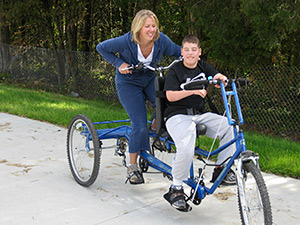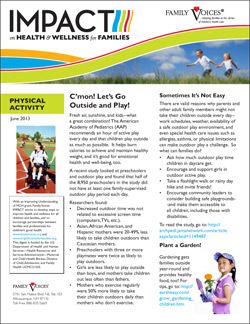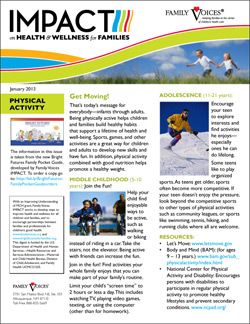
PHYSICAL ACTIVITY
SECTIONS: Background ~ Child and Family ~ Ages and Stages ~ What You Can Do

Get Moving! That's today's message for infants, toddlers, children, teens and adults. Being physically active helps children and families build healthy habits that will support a lifetime of health and well-being. Physical activity is a great way for children and adults to develop new skills and have fun. In addition, physical activity combined with good nutrition helps promote a healthy weight.
Physical Activity:
- Helps keep you healthy and helps encourage future health.
- Promotes physical and mental well-being.
- Helps family members develop and learn new skills.
- Is fun and can offer great social opportunities.
Child and Family
One of the great things about physical activity is that your child can be active alone or with friends. It's also a great way for families to spend time together. Physical activity helps balance the time that children and adults spend watching TV, playing video games, and using computers. Promoting good health through physical activity goes hand in hand with healthy eating.
Ages and Stages
- Infancy: Infants learn so much in the first year. They benefit when families provide safe opportunities for active play. This may include active floor time or "Mommy and Me" classes. Remember that "tummy time" is important for your baby. And while infant seats and car seats are important safety devices, babies need plenty of time to move about.
- Early Childhood: Toddlers and young children need safe places to climb and explore. They are learning to run, jump, skip, and to move around objects. Providing opportunities to practice these skills helps promote eye-hand coordination, bone growth, and more.
- Middle Childhood: Children this age generally have developed many skills and interests. Some will want to play supervised sports. Ask about age-specific sports leagues at your school, library, town hall, or recreation center. Others will enjoy free play, indoors and out. What you say and do is important. Invite your children for walks or hikes, play catch together, or jump rope. Encourage your children to be active with friends. Include outdoor playtime during play dates.
- Adolescence: At this age, school and league sports are often for those who excel. Help your teen find ways to be active that can provide life-long enjoyment, regardless of skill. Physical activity can be beneficial, even if it's not sustained. Short bursts of activity, like a lap around the mall before shopping, are valuable.
- Children with Special Health Care Needs: All children, including those with special health care needs, benefit from physical activity. With creativity and some accommodations, most children with special health needs can participate in the same activities as their friends. Attend a Special Olympics event to introduce your child to different sports opportunities. Talk with your child's health care providers about suitable activities and any special considerations.
What Can Families Do to Promote Physical Activity?
- Set a good example. Be active yourself. You might take a yoga class, park further from a store and walk, or take the stairs instead of the elevator.
- Provide opportunities, inside and outside, for physical activity. Play tag, toss a ball, go for a walk, or create an indoor obstacle course with household items.
- Physical activities do not have to be formal and scheduled; make time for unstructured fun, like an impromptu dance contest.
- Help your children find age-appropriate physical activities.
- Encourage their interests and growing skills.
- Explore opportunities for physical activity in your community - parks, recreation centers, playgrounds, public pools, bicycle trails, and other settings.
- Some schools have reduced or cut physical education (PE) classes and recess. Advocate for the importance of PE and recess in school.
- Many schools are now developing school wellness policies. Ask about participating in this process.
- Work with your town and community to ensure there are opportunities for all, including children and adults with special health care needs.
ADDITIONAL RESOURCES:
Download Project IMPACT
1-page updates:
5 updates found



